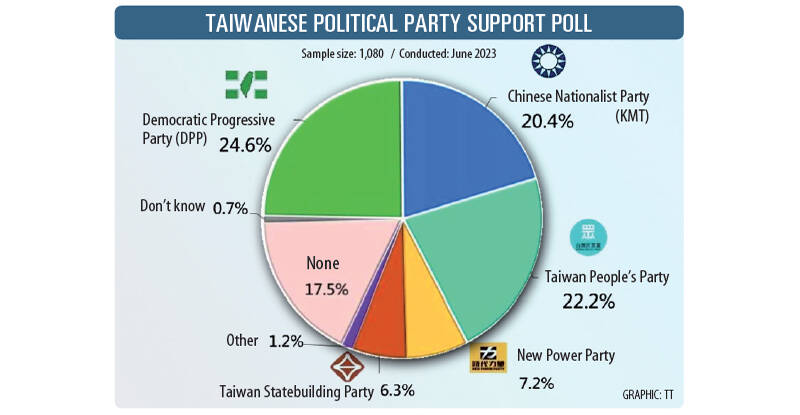The nation’s top three political parties for the first time have all received approval ratings higher than 20 percent, a poll released yesterday by the Taiwanese Public Opinion Foundation showed, while the Taiwan People’s Party’s (TPP) approval rating surpassed that of the Chinese Nationalist Party (KMT).
The TPP, established in 2019, has an approval rating of 22.2 percent, compared with 20.4 percent support for the KMT, the poll showed.
The ruling Democratic Progressive Party (DPP) received an approval rating of 24.6 percent.

This is the first time that three political parties in Taiwan have received approval ratings of more than 20 percent, the foundation said, calling it a potential “super bombshell” for the election in January.
The survey was conducted on Monday and Tuesday, and has a margin of error of about 3 percentage points.
The election is shaping up to be a competitive three-way race between the DPP, which is determined to maintain Taiwan’s political independence; the KMT, which seeks closer ties with China; and the TPP, which advocates for dialogue with China while presenting a middle-of-the-road alternative to the other two parties.
The poll results represent a “severe crisis” for the KMT, which has lost almost 3 million supporters over the past four years, due to factional infighting, the foundation said.
However, the outcome is by no means a win for the DPP.
The numbers are “a serious warning” to President Tsai Ing-wen’s (蔡英文) party, showing that it has also lost the support of more than 3 million voters since the previous presidential election in 2020, it said.
While the poll is sobering news for the KMT, for now the party remains a more influential force in Taiwanese politics than the TPP. The KMT governs 14 out of the 22 counties and municipalities, and has 37 lawmakers in the 113-seat Legislative Yuan, compared with five for the TPP.
Yesterday’s results showed the TPP’s highest support rating since its founding four years ago, the foundation said, adding that voters are clamoring for a “meaningful third choice.”
KMT National Policy Foundation head Ko Chih-en (柯志恩) said his foundation’s and other KMT polls showed that the party’s presidential candidate, New Taipei City Mayor Hou You-yi (侯友宜), was holding his own against TPP candidate and Chairman Ko Wen-je (柯文哲).
DPP Legislator Chuang Jui-hsiung (莊瑞雄) said that no one wants to be in third place, and those in such positions always claim to be in second spot.
However, DPP Legislator Liu Shyh-fang (劉世芳) said that the KMT still has a solid voter base, pointing to then-KMT presidential candidate Han Kuo-yu (韓國瑜) garnering 5 million votes in the 2020 presidential election.
Hou and Ko are respectable opponents, and the DPP should be cautious, Liu said, adding that Vice President William Lai (賴清德), the DPP’s candidate, is the best choice.
The TPP coming in second is not surprising, as it likely benefited from recent controversies involving a kindergarten in New Taipei City allegedly giving sedatives to pupils and widespread allegations of sexual harassment involving politicians, he said, adding that the DPP would run a cautious and solid campaign.
Additional reporting by Chen Cheng-yu

The Taiwanese passport ranked 33rd in a global listing of passports by convenience this month, rising three places from last month’s ranking, but matching its position in January last year. The Henley Passport Index, an international ranking of passports by the number of designations its holder can travel to without a visa, showed that the Taiwan passport enables holders to travel to 139 countries and territories without a visa. Singapore’s passport was ranked the most powerful with visa-free access to 192 destinations out of 227, according to the index published on Tuesday by UK-based migration investment consultancy firm Henley and Partners. Japan’s and

NATIONAL SECURITY THREAT: An official said that Guan Guan’s comments had gone beyond the threshold of free speech, as she advocated for the destruction of the ROC China-born media influencer Guan Guan’s (關關) residency permit has been revoked for repeatedly posting pro-China content that threatens national security, the National Immigration Agency said yesterday. Guan Guan has said many controversial things in her videos posted to Douyin (抖音), including “the red flag will soon be painted all over Taiwan” and “Taiwan is an inseparable part of China,” while expressing hope for expedited “reunification.” The agency received multiple reports alleging that Guan Guan had advocated for armed reunification last year. After investigating, the agency last month issued a notice requiring her to appear and account for her actions. Guan Guan appeared as required,

Japan and the Philippines yesterday signed a defense pact that would allow the tax-free provision of ammunition, fuel, food and other necessities when their forces stage joint training to boost deterrence against China’s growing aggression in the region and to bolster their preparation for natural disasters. Japan has faced increasing political, trade and security tensions with China, which was angered by Japanese Prime Minister Sanae Takaichi’s remark that a Chinese attack on Taiwan would be a survival-threatening situation for Japan, triggering a military response. Japan and the Philippines have also had separate territorial conflicts with Beijing in the East and South China

A strong cold air mass is expected to arrive tonight, bringing a change in weather and a drop in temperature, the Central Weather Administration (CWA) said. The coldest time would be early on Thursday morning, with temperatures in some areas dipping as low as 8°C, it said. Daytime highs yesterday were 22°C to 24°C in northern and eastern Taiwan, and about 25°C to 28°C in the central and southern regions, it said. However, nighttime lows would dip to about 15°C to 16°C in central and northern Taiwan as well as the northeast, and 17°C to 19°C elsewhere, it said. Tropical Storm Nokaen, currently